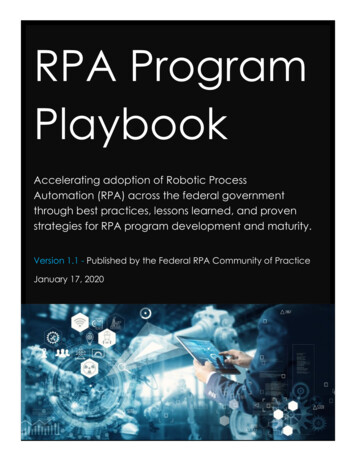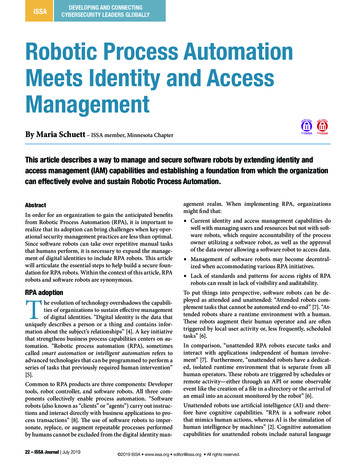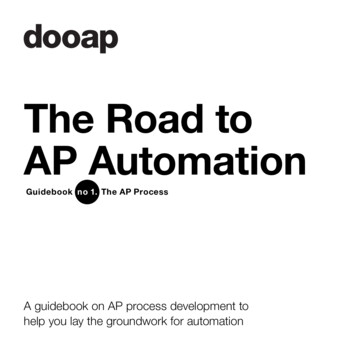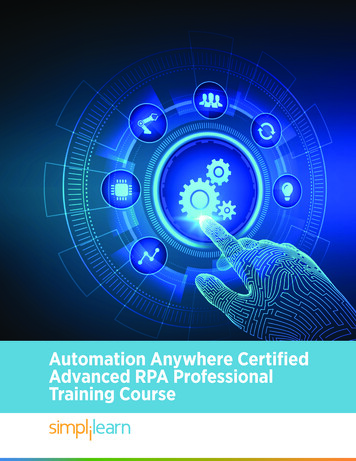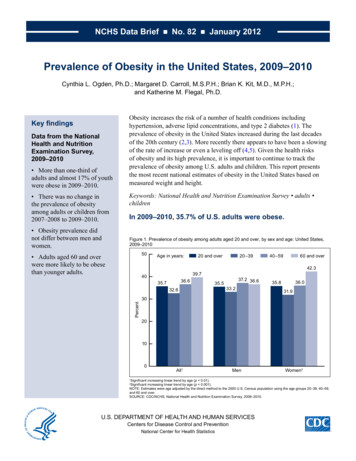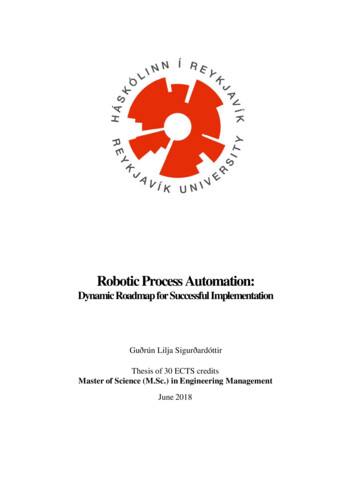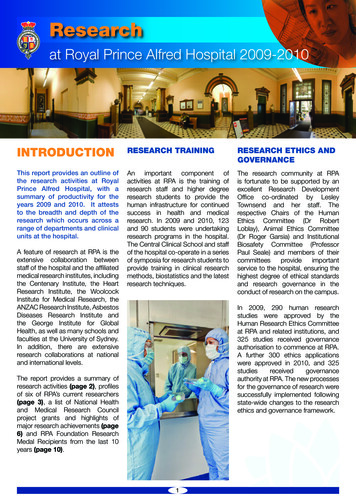
Transcription
Researchat Royal Prince Alfred Hospital 2009-2010INTRODUCTIONRESEARCH TRAININGRESEARCH ETHICS ANDGOVERNANCEThis report provides an outline ofthe research activities at RoyalPrince Alfred Hospital, with asummary of productivity for theyears 2009 and 2010. It atteststo the breadth and depth of theresearch which occurs across arange of departments and clinicalunits at the hospital.An important component ofactivities at RPA is the training ofresearch staff and higher degreeresearch students to provide thehuman infrastructure for continuedsuccess in health and medicalresearch. In 2009 and 2010, 123and 90 students were undertakingresearch programs in the hospital.The Central Clinical School and staffof the hospital co-operate in a seriesof symposia for research students toprovide training in clinical researchmethods, biostatistics and the latestresearch techniques.The research community at RPAis fortunate to be supported by anexcellent Research DevelopmentOffice co-ordinated by LesleyTownsend and her staff. Therespective Chairs of the HumanEthics Committee (Dr RobertLoblay), Animal Ethics Committee(Dr Roger Garsia) and InstitutionalBiosafety Committee (ProfessorPaul Seale) and members of theircommitteesprovideimportantservice to the hospital, ensuring thehighest degree of ethical standardsand research governance in theconduct of research on the campus.A feature of research at RPA is theextensive collaboration betweenstaff of the hospital and the affiliatedmedical research institutes, includingthe Centenary Institute, the HeartResearch Institute, the WoolcockInstitute for Medical Research, theANZAC Research Institute, AsbestosDiseases Research Institute andthe George Institute for GlobalHealth, as well as many schools andfaculties at the University of Sydney.In addition, there are extensiveresearch collaborations at nationaland international levels.In 2009, 290 human researchstudies were approved by theHuman Research Ethics Committeeat RPA and related institutions, and325 studies received governanceauthorisation to commence at RPA.A further 300 ethics applicationswere approved in 2010, and 325studiesreceivedgovernanceauthority at RPA. The new processesfor the governance of research weresuccessfully implemented followingstate-wide changes to the researchethics and governance framework.The report provides a summary ofresearch activities (page 2), profilesof six of RPA’s current researchers(page 3), a list of National Healthand Medical Research Councilproject grants and highlights ofmajor research achievements (page6) and RPA Foundation ResearchMedal Recipients from the last 10years (page 10).1
ResearchSummaryThe research income for 2009 from competitive grants obtained from the NationalHealth and Medical Research Council, the Australian Research Council and othernational and international funding bodies was 46.5 million. Category 2 grants includefunding from special disease-focussed funding bodies. The total research income for2010 was 47.4 million. These amounts do not include funding for the many clinicaltrials which are conducted throughout the hospital.The research findings from studies at RPA are widely published in medical literature. In 2009 therewere 585 peer-reviewed publications by the staff at the hospital, and in 2010 another 527 peerreviewed articles were published. Many of these findings are presented at national and internationalmeetings. Staff were invited to present papers on 542 occasions in 2009 and 2010. Importantly,a number of medical, nursing, scientific and allied health staff were recipients of awards fromnational bodies in 2009 and 2010.Table 1: RPA research summary 2009-201020092010Category 1 Grants* 29,934,584.19 33,325,245.07Category 2 Grants** 16,582,533.50 14,099,815.50Awards (International)1Awards (National)1821Research Students12390Peer-reviewed publications585527Invited Presentations182360*Category 1: Income from those research schemes and programs listed on the Australian Competitive GrantsRegister, including NHMRC and ARC grants.**Category 2: Other public sector research income including condition-specific funding.2
The following profiles provide insight into research in the different clinical andlaboratory departments within the hospital and the collaborative framework, which isessential for the success of health and medical research at RPA.ProfilesProfessor Jennifer Alisonchronic lung diseaseProfessor Jennifer Alison Clinical Specialist, PulmonaryRehabilitation, Department ofPhysiotherapy, RPA Lung and Heart PhysiotherapyResearch Group Leader;Director, Collaborationfor the Advancementof CardiopulmonaryPhysiotherapy; Teaching TeamLeader, CardiopulmonaryPhysiotherapy; ClinicalCoordinator, Physiotherapy,University of Sydney.With an interest in improving outcomes for people withlung disease, Professor Jennifer Alison’s research is allabout the patient.Professor Alison aims to improve lung function forpeople with chronic respiratory disease by designingexercise programs targeted to individual cases.Exercise programs are the major component ofpulmonary rehabilitation.The first study seeks ways to improve access to thebenefits of pulmonary rehabilitation across Australia,especially in rural and remote areas. Something assimple as walking may hold the key to better healthand wellbeing for people with lung disease. Theoutcomes of this study will be available towards theend of 2013, and may prove that walking can make areal difference.Lung disease makes physical activity harder. Byincreasing patient participation in activities, such asexercise, Professor Alison’s work aims to stabilise orreverse symptoms of the disease. People with lungdisease who undergo exercise training as part ofpulmonary rehabilitation have improved fitness levels,reduced symptoms of breathlessness and fatigue,a better quality of life and are less likely to go tohospital.In the second project, Professor Alison is exploringwhether using oxygen during exercise benefits patientsliving with lung disease. In more severe lung disease,oxygen levels may fall during exercise which can affecta patient’s ability to exercise.By measuring the responses to exercise trainingusing oxygen, compared to using medical air, she candetermine whether oxygen does help. Should this bethe case, exercise programs can be devised whichinclude breathing oxygen.Professor Alison is currently working on two NationalHealth and Medical Research Council funded projectsrelated to people with chronic obstructive pulmonarydisease.In all that she does, Professor Alison is driven toenhance quality of life and improve participation in lifefor people with lung disease, reduce health care costsand importantly keep people out of hospital.Professor Paul Bannonheart and lung diseaseAmong his many positions, Professor Paul Bannon isdedicated to a life of surgery and research – takingdiscoveries from the laboratory bench to the patient’sbedside. Professor Bannon completed his surgicaltraining at RPA. Under the guidance of the lateProfessor Douglas Baird he was encouraged to takeup research and has never looked back.Professor Paul Bannon Visiting medical officer,cardiothoracic surgery andhead of cardiothoracicresearch, RPA Professor and Chair ofCardiovascular Surgery, CentralClinical School, University ofSydney Chairman, Baird Institutefor Applied Heart and LungSurgical ResearchProfessor Bannon’s interests are extensive and havethe potential to result in major breakthroughs for theearly detection, prevention and treatment of heart andlung disease.The aorta is the main supplier of blood to the body.If weakened or enlarged, it can cause a rupture, oraneurysm, which is life threatening. Professor Bannonis investigating how the aorta works and whether theconditions that cause aneurysms are inherited. Theaim is to predict ruptures before it is too late, and allowsurgery to be performed at the best time so that it islow risk.Professor Bannon is also overseeing excitingdevelopments in the creation of ‘off the shelf’ bloodvessels made of biocompatible materials. Thematerials used are compatible with the human body3so that the vessel is not rejected when inserted. Ifsuccessful, these devices can be used to replacedamaged vessels and improve heart function with veryfew complications.Together with the Bernie Banton Centre, ProfessorBannon is working towards a breakthrough in themanagement of one of the most devastating formsof lung cancer – mesothelioma. The team has madegreat surgical progress to improve survival rates, butthere is much more to do.He is also working on innovative heart surgery todetermine the best course of action for high riskpatients and to reduce the risk of stroke during surgery.Underpinning these areas is a dedicated researchgroup at RPA, which reviews leading evidence fromaround the world to get better outcomes for researchand surgery.Professor Bannon is also committed to developingyoung surgeons into thinkers and leading researchers.Success in these areas may allow him to reach hisultimate goal – to be out of a job.
ResearchProfilesProfessor Warwick BrittonimmunologyThe year was 1978, the location Nepal. ProfessorWarwick Britton began his research affair with leprosyand tuberculosis.An immunologist by profession, Professor Brittonhas discovered much about the immune system bystudying infectious diseases such as tuberculosis.Tuberculosis is a highly contagious disease withdevastating effects. It has had a long history, but isplagued by new challenges – drug-resistant strains,the threat of HIV and undetected cases.Professor Warwick Britton Clinical immunologist, RPA Bosch Professor of Medicineand Professor of Immunology,University of Sydney Head of the MycobacterialResearch Program, CentenaryInstituteIt is still rife in some of Australia’s closest neighboursincluding Indonesia, Papa New Guinea and Vietnam.Over the decade, Professor Britton has collaboratedwith a team, including Professor Guy Marks, to discovermuch about the disease including its genetic make-up,its interaction with the immune system and how bestto diagnose it early to control its spread.The team’s findings have been possible thanks to acontainment lab at the Centenary Institute allowingresearchers to investigate the disease in a controlledenvironment without fear of infection.The aim is to now put this in-depth research intopractice. The recent award of a NHMRC Centre forResearch Excellence in tuberculosis control will allowthem to do just that. The five-year funding will enable ateam of Australian researchers with colleagues in Asiato create a hub for tuberculosis research and trainingin Australia. The focus is on developing new vaccines,diagnostic tools and strategies for the early detectionand control of this highly infectious disease.Professor Britton’s legacy lives on in Nepal with aresearch laboratory he created in 1986 still operating.Professor Chris SemsariancardiologyIn a fantastic example of collaboration between theUniversity of Sydney, RPA and the Centenary Institute,Professor Chris Semsarian is leading a team that isembarking on breakthrough and internationally leadingresearch.The team has been awarded two National Health andMedical Research Council grants. With a nationalsuccess rate of 17 per cent, gaining two grants istestament of the calibre of the team and importanceof its work.Professor Chris Semsarian Cardiologist, Royal Prince AlfredHospital Professor of Medicine, Universityof Sydney Head of the Molecular CardiologyGroup, Centenary InstituteOne of the grants will look at the link betweengenetically-based sudden cardiac death and epilepsy;the other continues work on the genetic basis in familieswith hypertrophic cardiomyopathy. The overarchinggoal with both research pieces is to discover new genefaults in cases of hypertrophic cardiomyopathy andsudden death in epilepsy.Using the latest technology the team will look into all23,000 genes, in the hope of making life changingdiscoveries for patients and families living with theseconditions.Hypertrophic Cardiomyopathy is the most commongenetic heart disorder. In about 50 per cent of casesthe gene abnormality is unknown, and tragically insome cases the first sign of disease is sudden death.4Through the research, the team aims to identify genefaults and translate this into strategies to identifyrisk, treat patients accordingly, and most importantlyprevent sudden death.The cause of sudden death in epilepsy remainsa mystery, and yet is the most common cause ofepilepsy-related death.The research is based on the notion that there is agene which controls both electrical rhythms of thebrain and heart, to find a link between heart diseaseand epilepsy. By delving deeper he hopes to learnmuch more about the condition.Professor Semsarian is hopeful that a life-changingdiscovery will be made to help patients and theirfamilies cope with these conditions, and to makea lasting impact both at home and for the globalcommunity.Professor Semsarian was the recipient of the RPAFoundation Medal for Excellence in Medical Researchin 2009, and received the 2012 RT Hall Prize forResearch, the highest award given by the CardiacSociety of Australia and New Zealand each year. Bothawards recognised his outstanding research into theclinical and genetic basis of heart disease in the young.
ProfilesProfessor Jon HyettobstetricsAs a specialist in maternal and foetal medicine,Professor Jon Hyett looks after pregnancies that havea high risk of complication – either for the mother, orfor the foetus.Professor Hyett has worked at RPA for five years, havingtrained in obstetrics, maternal and foetal medicine inthe UK before working in Australia. At RPA, he leadsa research group which has a strong clinical focusand a continual dedication to research to maintain thehighest standards of obstetric care.Professor Jon HyettThe group’s main research interest is to predict risk ofpregnancy complication, either at an early stage (12weeks), or immediately before delivery (at 36 weeks). Head of high risk obstetrics, RPAWomen and Babies Clinical Professor, Obstetrics,Gynaecology and Neonatology,Central Clinical SchoolThe group is currently working on a way to predictthe risk of pre-eclampsia, a disease harmful to boththe mother and foetus. If a risk is found at 12 weeks’pregnancy, simple treatments like aspirin may preventthe onset of this disease.Professor Hyett’s team is also leading the way inAustralia with non-intrusive ways to screen pregnantwomen. A simple blood test can be used to define thefoetus’ blood group by testing minute amounts of foetalDNA found in the mother. The group is on the cusp of abreakthrough by testing how this method may be usedto screen for Down syndrome, and other complications,at as early as 10 weeks’ into a pregnancy.Through a National Health and Medical ResearchCouncil grant, the group is also studying the effect ofrotating babies that are badly positioned during labourto reduce the rate of caesarean sections.High risk obstetrics is a rewarding and diverse specialityfor Professor Hyett who is constantly kept busy withthe range of research needs this field demands.Associate Professor Sandra O’Toolepathologist and cancer researcherClinical Associate Professor Sandra O’Toole has beenworking at Royal Prince Alfred Hospital for two and ahalf years, but has spent the last decade engaged inbreast cancer research.Associate Professor O’Toole is studying how genesthat influence development in embryos may play animportant role in breast cancer and how blockingthese genes may provide a promising new approachto treating the most aggressive types of breast cancer.Associate ProfessorSandra O’Toole Head of Molecular DiagnosticOncology, Royal Prince AlfredHospital Clinical Associate Professor,Medicine, Central ClinicalSchool, University of Sydney Co-Director Breast CancerResearch Group KinghornCancer Centre, Garvan Instituteof Medical ResearchThe Hedgehog pathway is most active in the earlieststages of life where it directs the formation of organsand limbs. It typically lies dormant in adult years,but may be reactivated in some types of cancers.Associate Professor O’Toole has recently shown theHedgehog pathway is associated with a particularlyaggressive and difficult to treat type of cancer called‘triple negative’ breast cancer. This type of breastcancer accounts for around 10 to 15 per cent ofcases and tends to occur in younger women. Witha multidisciplinary team of scientists and cancerspecialists, Associate Professor O’Toole, also showedthat blocking this pathway significantly decreased thegrowth and spread of cancer cells, and could be a newapproach in treating this aggressive type of breastcancer.5She is working with Associate Professor Jane Beithand Dr Alexander Swarbrick towards developing andtesting treatments to block the Hedgehog pathwayin breast cancer. It is hoped a clinical trial will startat RPA soon. A grant from the Sydney Breast CancerFoundation has allowed the establishment of a tissuebank of breast cancers which are studied to understandthe gene changes that occur and how they may beused to better diagnose and treat this disease.Associate Professor O’Toole was inspired to starther career in breast cancer research after seeingthe terrible impact breast cancer had on her mother.One of the most enjoyable aspects of research forher is working with a team of scientists, medical andsurgical cancer specialists, to tackle challenges fromall angles using basic and clinical science to find theright answers.
ResearchNational Health and Medical Research Council ProjectsIn 2010, 14 NHMRC grants were awarded to staff atRPA and a further nine grants to investigators in relatedresearch institutes. A number of these new studies in2010 are focussed on diabetes, including the impactof genetic factors on complications in type 2 diabetesand mechanisms of kidney disease and liver diseasein diabetes. Professor Jennie Brand-Miller from theUniversity of Sydney and Dr Tanya Markovic and DrGlynis Ross from the Diabetes Centre commenceda new randomised controlled trial on the impact ofdietary intervention in gestational diabetes to reducesubsequent obesity in children. Professor MatthewVadas and colleagues from the Centenary Institute,including Professor Geoff McCaughan from the AWMarrow Gastroenterology and Liver Department, weresuccessful in obtaining an NHMRC program grantto study inflammation, new blood vessel formationand cancer. This study will address the major globalproblem of liver fibrosis and liver cancer, which affectsalmost half a billion of the world’s population throughviral hepatitis and alcohol. Professor Craig Andersonand Associate Professor Anushka Patel from theGeorge Institute and the Departments of Neurologyand Cardiology were successful in obtaining NHMRCResearch Fellowships to continue their studies in heartdisease, cerebrovascular disease and hypertension.The NHMRC grants awarded to commence in 2009(table 2.1) and 2010 (table 2.2) demonstrate the widerange and quality of research at RPA. They exemplifythe research occurring in different departments. Forexample, Dr Miriam Welgampola and Professor MichaelHalmagyi in the Department of Neurology receivedsupport to continue their internationally recognisedstudies on how the nervous system controls balance.Professor Phyllis Butow and Professor MartinTattersall with their colleagues from the Departmentsof Medical and Surgical Oncology and the Centre forMedical Psychology and Evidence-Based Decisionmaking in the School of Psychology at the Universityof Sydney received support to study methods forimproving the quality of life for patients at the endstage of life. This builds on their studies in improvingcommunication between patients with cancer andtheir doctors. Professor Wolfgang Weninger fromthe Department of Dermatology and the CentenaryInstitute has established specialised microscopytechniques to study living cells to understand how theimmune system functions. With his team, he will usemultiphoton imaging to study early immune responsesto infection in the skin.In 2009, Professor Steven MacMahon and colleaguesfrom the George Institute and Departments ofCardiology and Neurology at RPA were successfulin obtaining an NHMRC program grant to generateevidence for new strategies to combat cardiovasculardiseases, including hypertension, heart disease andcerebrovascular disease.Eleven other NHMRCproject grants were awarded to investigators from theCentenary, George, Heart Research and Woolcockinstitutes.6
National Health and Medical Research Council ProjectsTable 2.1: 2009 NHMRC project grantsRoyal Prince Alfred Hospital, University of Sydney and affiliated medical research institutesChief investigators*TitleTotal budgetAssociate Professor Jennifer A. AlisonAssociate Professor Sue C. JenkinsAssociate Professor Peter R. EastwoodProfessor Christine R. JenkinsProfessor David HillmanDr Zoe J. McKeoughWalking training in people with ChronicObstructive Pulmonary Disease 421,500Professor Phyllis N. ButowProfessor Martin HN TattersallDr Josephine M. ClaytonAssociate Professor Jane M. YoungProfessor Patricia M. DavidsonProfessor Ronald M. EpsteinImproving quality of life at the end of life 660,800Prof. Barbara D Fazekasde St GrothDr Stephen I AlexanderDr Vicki LevidiotisPrimed T cells in graft rejection 521,250Prof. John D. PollardDr Min-Xia WangThe mechanism of action of IVIG ininflammatory neuropathy 434,700Dr Bernadette M. SaundersProfessor Warwick J. BrittonProfessor Georges E. GrauPulmonary inflammation and TB infection 438,000Professor Colin E. SullivanProfessor Warwick B. GilesProfessor Annemarie HennessySleep disordered breathing in pregnancy 583,250Dr James A. TriccasProfessor Warwick J. BrittonChronic bacterial infection and T cell memory 526,500Dr Miriam S. WelgampolaProfessor Michael HalmagyiDr Richard C. FitzpatrickProfessor Brian L. DayA test of balance pathways to the trunk andlimbs 239,250Professor Wolfgang WeningerDr Lai Guan NgInnate immunity in skin infections 491,250Dr Adam R. WinstockProfessor Iain S. McGregorAssociate Professor Nicholas LintzerisTrial of lithium carbonate for cannabiswithdrawal 507,500NHMRC Practitioner Fellowship 2009 RPA and Centenary InstituteAssociate Professor Christopher Semsarian, PF2, University of SydneyNHMRC Program Grant 2009 to the George InstituteProfessor Stephen W MacmahonProfessor John P ChalmersAssociate Professor Bruce C NealProfessor Mark WoodwardProfessor Craig S AndersonAssociate Professor Anushka PatelGenerating the Evidence for New Strategies toCombat Cardiovascular Diseases* Grants awarded to hospital staff as chief investigators7 12,119,660.0
ResearchNational Health and Medical Research Council ProjectsTable 2.2: 2010 NHMRC project and other grantsChief investigators*TitleTotal budgetAssociate Professor Jane YoungProfessor Phyllis ButowProfessor Michael SolomonProfessor Patricia DavidsonDr David MartinMr James HarrisonImproving psychosocial outcomes for cancercarers: a randomised control trial 515,600Professor Ian CurthoysProfessor Michael HalmagyiDr Ann BurgessMr Leigh McgarvieVestibulo-ocular responses to boneconducted vibration 272,750Dr Craig Phillips (RNSH)Professor Ronald GrunsteinProfessor Peter CistulliDr Hisatomi ArimaChronotherapy for hypertension inObstructive Sleep Apnea 245,625Dr Martin NgDr Christine BursillMultifunctional regulation of angiogenesis byhigh density lipoproteins 463,500Associate Professor Stephen TwiggDr Susan McLennanAssociate Professor Mark GorrellDiabetes exacerbates non-alcoholic steatohepatitis 545,500Professor Anthony KeechAssociate Professor Alicia JenkinsProfessor James BestAssociate Professor David SullivanAssociate Professor Stephen TwiggUnlocking genetic factors predicting Type 2Diabetes complications for clinical practice:The Field Study 242,850Dr Simon LewisDr Sharon NaismithAssociate ProfessorNaomi RogersProfessor John HodgesThe impact of circadian disturbances on sleepquality, cognition and psychiatric symptoms inneurodegenerative disease 479,000Professor Steven ChadbanProfessor Carol PollockDr Huiling WuDr Usha PanchapakesanThe Role of Toll-like receptors in DiabeticNephropathy 712,875Professor Guy MarksProfessor Warwick BrittonAssociate Professor Dinh Ngoc SyDr Nguyen Viet NhungDr James WoodA new direction for TB control in highlyendemic countries: a RCT of active casefinding 1,296,643Professor Guy MarksProfessor Richard MenziesProfessor John SealeA randomized clinical trial comparing 472,625effectiveness of 4RIF and 9INH for treatment oflatent TB infectionProfessor Geoffrey McCaughanDr Nicholas ShackelDr Fiona WarnerThe role of the hepatocyte hedgehog pathwayin progressive liver injury 550,500Professor Jennie Brand-MillerDr Tania MarkovicDr Glynis RossA dietary intervention in gestational diabetes toreduce child obesity: a randomised controlledtrial 342,125Dr Richard PayneProfessor Warwick BrittonInhibition of siderophore biosynthesis fortuberculosis drug discovery 409,1258
National Health and Medical Research Council ProjectsChief investigators*TitleTotal budgetProfessor Christopher SemsarianAssociate Professor Robert WeintraubAssociate Professor Johan DuflouDr Rajesh PuranikAssociate Professor Jon SkinnerInvestigation of sudden cardiac death in theyoung 658,500Professor Christopher SemsarianAssociate Professor Stephen TwiggDr Tatiana TsoutsmanKey role of connective tissue growth factor infamilial cardiomyopathy and heart failure 381,125Professor Wolfgang WeningerDr James TriccasVisualisation of gamma-delta T cell responsesin cutaneous inflammation 550,500NHMRC Program Grants 2010 to the Centenary InstituteProfessor Mathew VadasProfessor Geoff McCaughanProfessor Jennifer GambleAssociate Professor Pu XiaDr Patrick BertolinoInflammation, angiogenesis and cancerNHMRC Program Grants 2010 to the Centenary InstituteNHMRC PRACTITIONER FELLOWSHIPS 2010George Institute and RPAProfessor Craig Anderson, SPRF, University of SydneyAssociate Professor Anushka Patel, SRF A, University of Sydney* Grants awarded to hospital staff as chief investigators9 8,020,000
ResearchFoundation MedalIn 2009 Professor Semsarian was also the recipient ofan NHMRC Practitioner Research Fellowship.2009 was the 10th year of the RPA Research Prize.The recipients of this prestigious prize receive the RPAFoundation Research Medal and 50,000 as supportfor their ongoing research.In 2010 Associate Professor Martin Ng from theDepartment of Cardiology at RPA and the HeartResearch Institute was the recipient of the RPAResearch Prize for his work investigating revascularisation for cardiovascular disease by modifyingthe growth of blood vessels and tissue engineering.The Prize recognised his work on the development ofartificial blood vessels in collaboration with ProfessorAnthony Weiss from the University of Sydney. BothProfessor Semsarian and Dr Ng have strong records inthe research training of young scientists and clinicians.In 2009 Professor Chris Semsarian from the Departmentof Cardiology at RPA and the Centenary Institute wasthe recipient of the award for his research into thegenetic basis of heart disease, including the causes ofhypertrophic cardiomyopathy, cardiac arrhythmias andsudden death. Professor Semsarian used the prizemoney to establish a National Centre for Heart DiseaseRegistry, which has proved a significant benefit forresearchers and families affected by these conditions.Table 3: RPA Foundation Research Medal Recipients 2000-2010YearRecipientTopic2000Professor Geoffrey McCaughan, Gastroenterology Liver disease and transplantation2001Dr Sandra Anderson, Respiratory Medicine2002Dr Susan Clark, Kanematsu Institute/ Haematology Control of gene expression2003Professor John Rasko, Medical OncologyGene therapy2004Professor Warwick Britton, Clinical ImmunologyImmunological control of Tuberculosis2005Associate Professor Peter Bye, RespiratoryMedicineTherapy for Cystic Fibrosis2006Professor Clive Harper, Anatomical PathologyPathogenesis of dementia and alcohol braindamage2007Professor David Celermajer, CardiologyIdentifying and preventing early atherosclerosisand heart disease2008Professor Craig Anderson, NeurologyCauses and prevention of stroke2009Professor Chris Semsarian, CardiologyCauses and prevention of genetic heart disease2010Dr Martin Ng, CardiologyRevascularisation for heart diseaseAsthma physiology, diagnostics and therapy10
Foundation MedalThe Annual RPA Foundation MedalforExcellence &Outstanding AchievementinMedical ResearchDr Martin Ng - 2010Professor Chris Semsarian - 2009Professor Craig Anderson - 2008Professor David Celermajer - 2007Professor Clive Harper - 2006Professor Peter Bye - 200511
Foundation MedalThe Annual RPA Foundation MedalforExcellence &Outstanding AchievementinMedical ResearchProfessor Warwick Britton - 2004Professor John Rasko - 2003Dr Sandra Anderson - 2001Professor Geoffrey McCaughan - 200012Dr Susan Clark - 2002
embarking on breakthrough and internationally leading research. The team has been awarded two National Health and Medical Research Council grants. With a national success rate of 17 per cent, gaining two grants is testament of the calibre of the team and importance of its work. One of the grants will look at the link between




